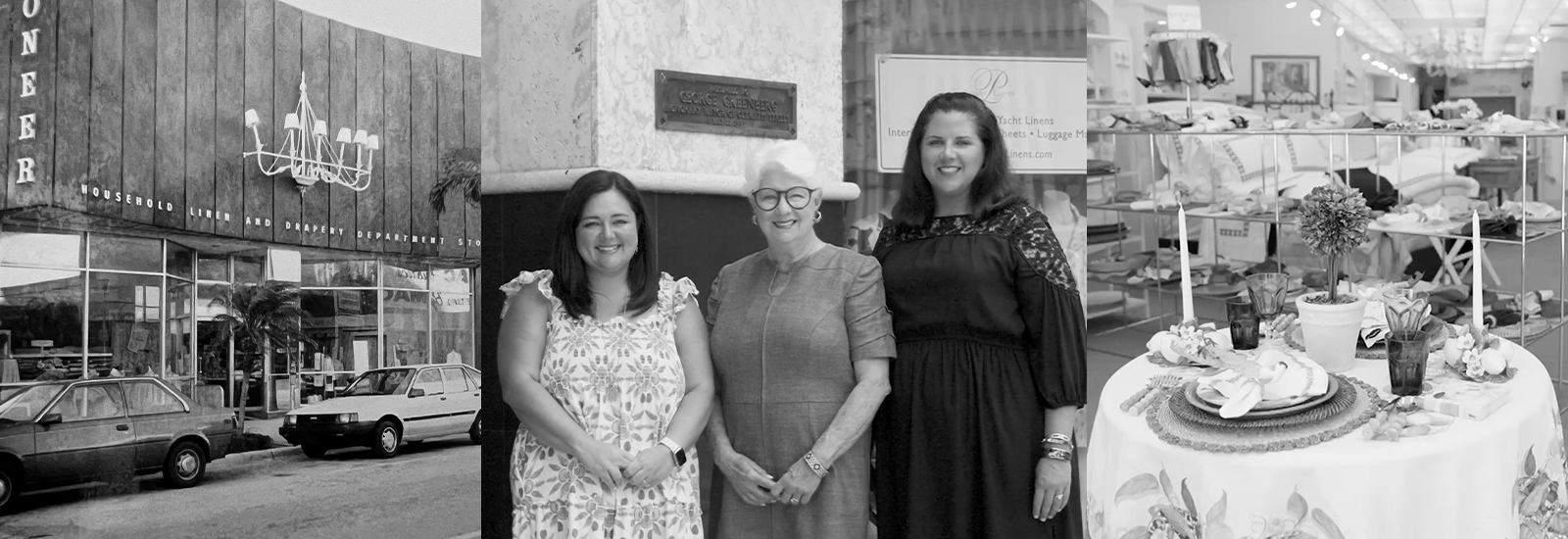Key takeaways
- Business heirs need clear responsibilities and a plan for advancing or growing their skillset to get ready for future leadership.
- Third parties like a financial advisor or business consultant can guide sensitive succession planning conversations.
- Writing a formal succession plan helps ensure your small business will have a leader in its next chapter.
Pioneer Linens has survived hurricanes, recessions, and a seasonal economy for four generations. While beachy weather has come and gone in that time, someone from Penny Murphy’s family has remained at the helm of the fine linens retailer in downtown West Palm Beach, Florida, for well over a century.
Longevity is a hallmark of many family-owned small businesses, but it takes planning. Deciding who succeeds in leading the enterprise and how they do it are critical to continuing the founder’s entrepreneurial legacy and helping the business thrive.
“I believe my children are as committed to this business as my father, my grandfather, and I have been,” said Murphy, owner and president of Pioneer Linens. “We have a beautiful store and a beautiful product, and we’ve worked hard to earn a good reputation. I think they’d be happy to [take it on].”
Here are succession planning tips for family-owned business owners or any entrepreneurs looking to foster future leaders and extend the life of their small business.
Key aspects of family business succession planning
Define roles and responsibilities
The first secret to working alongside any loved one is defining roles and responsibilities and prioritizing those according to what’s important to you and your business. Ask yourself: What are the most important and impactful positions within the business to keep filled? What essential duties, business goals, or external relationships must they support or maintain?
For many family-owned operations, this will be the CEO or president of the business, in addition to who will be taking on ownership as the next proprietor. However, a succession plan can address any position that plays an essential leadership or strategic role for the business.
Find the right heir(s)
Who will lead your business next? For entrepreneurial families, the potential talent pool may be relatively small if owners or leaders are only considering loved ones, such as a child, niece or nephew, or another member of a younger generation. If not, a wider list of potential candidates may include seasoned employees, in-laws, or recruited professionals in your market or industry.
One thing to consider with a successor is if they’re already an employee and know the business, or if they need to learn the ropes. Some entrepreneurs may opt to have the upcoming generation explore what interests them first.
For Murphy, it was important to let her kids forge their own paths in life prior to joining the business. When they eventually wanted to come aboard after graduating college and starting careers, she created positions for them based on the company’s needs, mainly in sales and operations.
Over time, two of her children, Marissa Murphy-Adriaanse and Camile Murphy-Kubicek, have found ways to step up, such as becoming a buyer and creating a private label, the Pioneer Linens Signature Collection. Growing their web presence with social media was also necessary.
“Part of why a business is going to succeed is how creative that next generation is,” Murphy said.
Communicate with and develop successors
Clear communication will help develop your potential successors and support your succession plan. It not only makes the process of creating and maintaining a plan of action more transparent, it creates an opportunity to have important conversations with the next generation about their thoughts about the business and taking on leadership. Their buy-in is essential to the plan.
A formal succession plan is also an opportunity to consider the future needs of your business and make sure a future leader will be prepared to achieve what’s needed to keep it going for the next generation.
What does a succession plan include? A formal plan will identify up-and-coming leaders to fill priority roles — or a process of finding or recruiting them — and set a timeline of potential advancement. It should include an analysis of what the next generation brings to the table and what experiences they will need to take on future leadership. Those may include degrees, certifications, mentoring, skills, or milestones. The plan may lay out how or when an heir takes on a leadership role on an interim basis, too.
Succession planning will likely be an ongoing conversation, as a suitable heir or heirs are identified, take on more responsibility, grow their skills, and form their own life goals over multiple years. Your plan should be a living document that you return to as the needs of the business and your vision of your successor evolves.
When to consider using outside experts
When love and money mix, conflict is often a concern. A third party can step in to help alleviate friction, draft a formal succession plan, or coach a next-generation business owner. Just be intentional about who you’re talking to and why.
Your business banker or advisory services professional can help, though they may be limited to working with authorized representatives. Your company’s lawyer or legal counsel may only represent the interests of the business, the CEO, or certain leaders.
Depending on your business, a financial advisor, succession planning consultant, or estate planning professional may be able to holistically address your needs and those of your family and your business. These professionals can help you explore all your options, including selling the business or exploring other transition options if the path is right for you.
Murphy has worked with an attorney on a potential succession plan and a business coach to help her family through challenging times.
“There are so many variables right now as to what’s going to happen [with Pioneer Linens] and what [my daughters] want to do,” she said.
Benefits of succession planning
Making a succession plan can be tough. It can stir up conflict or tough family or money conversations, but the work can be worth it. By documenting your wishes for when you step down or pass on, a formal succession plan guides your business through a transition and extends its life.
Yet only about a third of family-owned businesses have a “robust, documented, and communicated” succession plan, according to a 2023 PWC survey.
When control of Pioneer Linens was quickly passed to her, Murphy didn’t have much training to lead the business. She was, however, inspired by a goal of celebrating the store’s 100th birthday to keep it running. Now, more than 113 years after it opened, Murphy is weighing paths forward. If she decides to pass the business on, Murphy has raised the fourth generation to be ready.
“I’m certainly confident that if I decided that I wanted to have them [take on the store], that they’d be incredibly successful at doing it,” she said. “They’ve learned a lot. They’re smart. They’re very hard workers and very dedicated. Not only that, but they have that pioneer spirit that is part of their legacy.”






